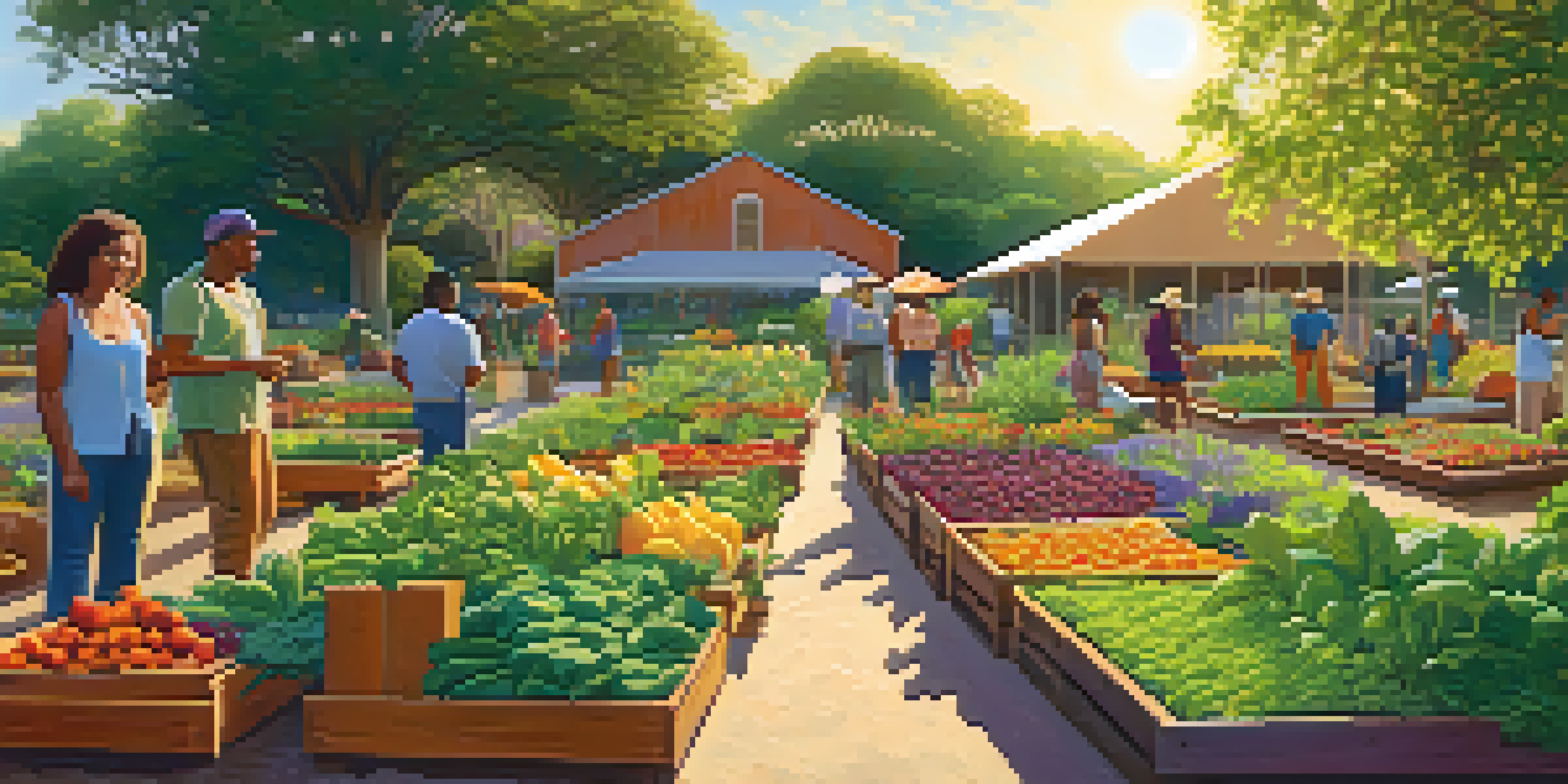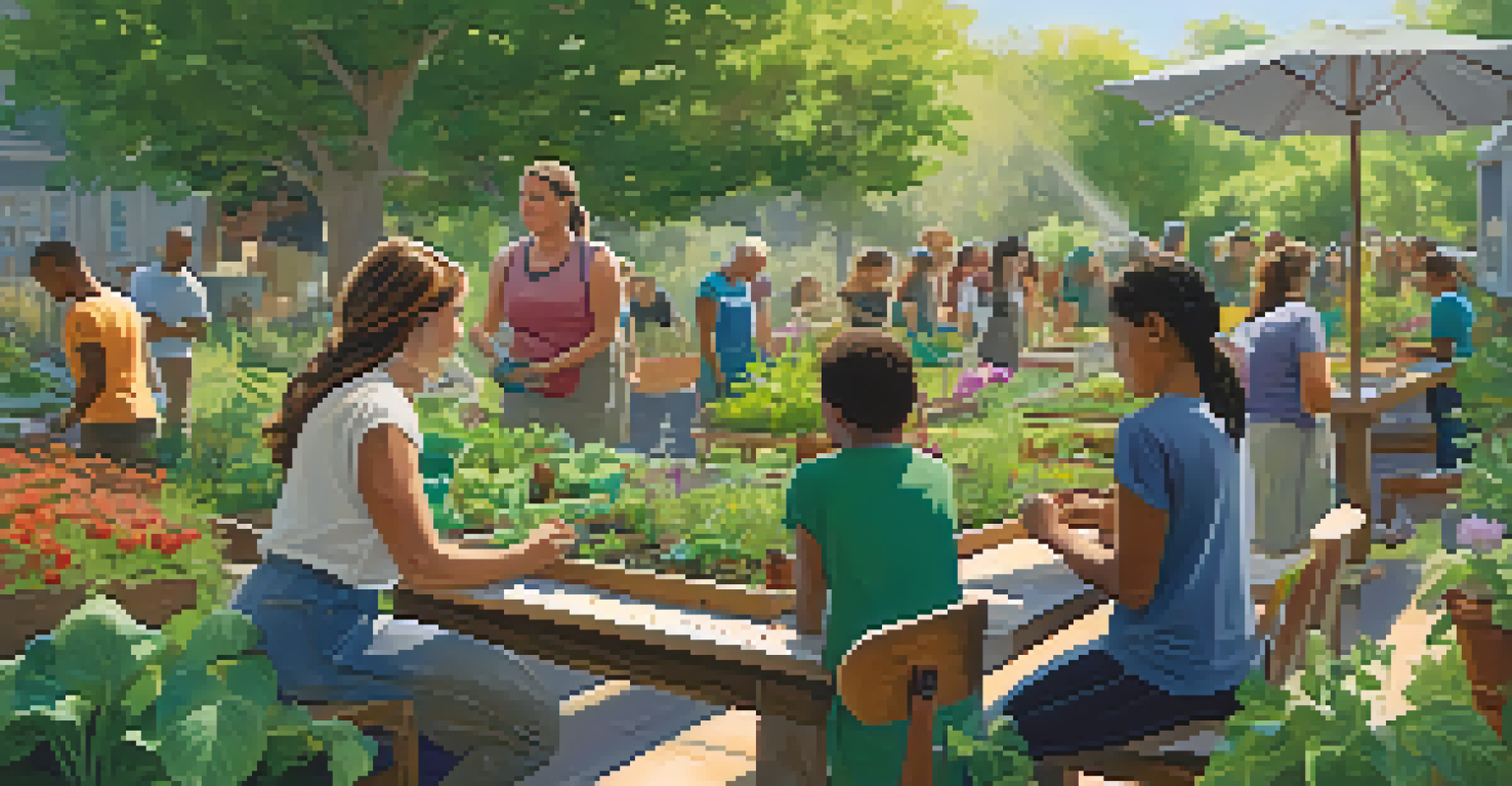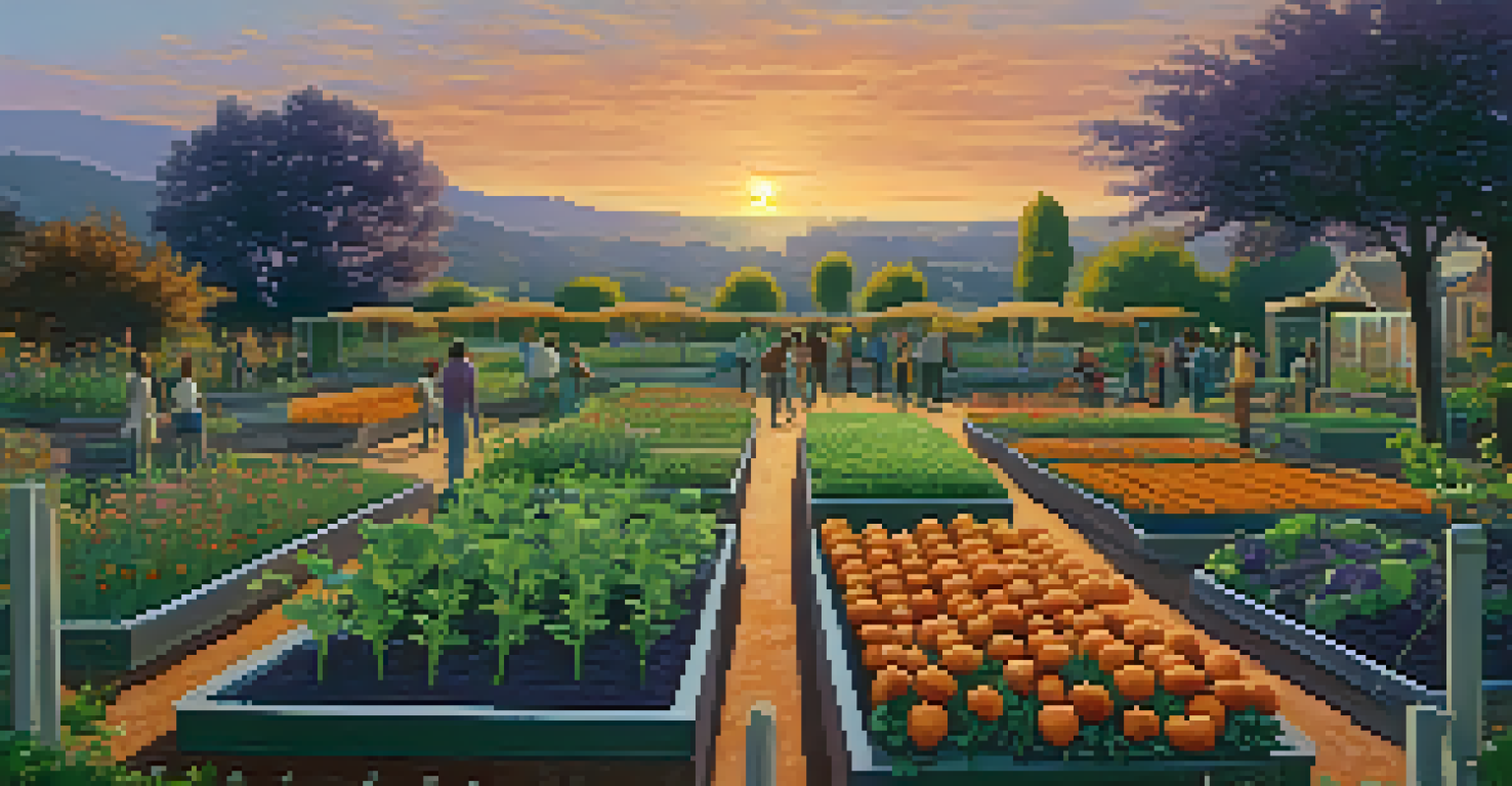Florida's Community Gardens: Enhancing Food Security Together

Understanding Community Gardens in Florida
Community gardens are shared plots of land where individuals come together to grow fruits, vegetables, and flowers. In Florida, these gardens not only beautify neighborhoods but also serve as vital resources for food production. They encourage collaboration among diverse groups, fostering a sense of community as residents work side by side.
To forget how to dig the earth and to tend the soil is to forget ourselves.
These gardens can vary in size and purpose—from small backyard initiatives to larger city-run projects. Regardless of their scale, they often focus on sustainable practices that benefit both the environment and community members. By growing their own food, residents gain access to fresh, nutritious options while also learning valuable gardening skills.
In a state known for its rich agricultural heritage, community gardens represent a modern solution to food insecurity. They empower individuals to take control of their food sources, particularly in areas where access to fresh produce is limited. This grassroots movement is helping to redefine what food security looks like in Florida.
The Role of Community Gardens in Food Security
Food security means having reliable access to a sufficient quantity of affordable, nutritious food. Community gardens play an essential role in achieving this by providing fresh produce to local residents. In many urban areas of Florida, where food deserts exist, these gardens serve as a lifeline for families seeking healthy options.

By growing their own food, community members can reduce their grocery bills while increasing their intake of fruits and vegetables. This not only improves individual health but also strengthens the overall well-being of the community. Plus, surplus produce can often be shared or sold, creating a local economy around the garden.
Community Gardens Enhance Food Security
These gardens provide fresh produce to local residents, helping to alleviate food deserts in urban areas of Florida.
Moreover, community gardens help educate individuals about nutrition and sustainable practices. Workshops and shared knowledge within these gardens empower residents to make healthier food choices and understand the importance of food sovereignty. This education is crucial in building a resilient community that values local food systems.
Building Community Through Shared Gardening
One of the most beautiful aspects of community gardens is their ability to bring people together. They create a space where individuals from various backgrounds can unite with a common goal: to grow food and foster relationships. This collaboration nurtures friendships and promotes a sense of belonging.
The best time to plant a tree was twenty years ago. The second best time is now.
Many gardens host events, such as planting days, harvest festivals, and cooking demonstrations, drawing in residents and creating a vibrant social atmosphere. These gatherings not only celebrate the fruits of their labor but also allow for the exchange of ideas and cultures, enriching the community fabric.
Additionally, community gardens often involve partnerships with local organizations, schools, and businesses. These collaborations can lead to improved resources, knowledge sharing, and even funding opportunities, making the gardens more sustainable and impactful. The collective effort creates a strong support network that benefits everyone involved.
Sustainable Practices in Florida's Community Gardens
Sustainability is at the heart of many community gardens in Florida. Gardeners often utilize organic practices, such as composting and crop rotation, to maintain healthy soil and reduce waste. These methods not only yield better produce but also contribute positively to the environment.
Water conservation is another vital practice in these gardens, especially in Florida's often hot and humid climate. Many community gardens implement rainwater harvesting systems and use drip irrigation to efficiently manage water usage. This ensures that the gardens remain productive while minimizing their ecological footprint.
Gardens Foster Community Connections
Community gardens bring together individuals from diverse backgrounds, promoting collaboration and friendships through shared gardening efforts.
Furthermore, community gardens often serve as educational hubs for sustainable agriculture. By demonstrating eco-friendly practices, they inspire others in the community to adopt similar methods in their own gardens or at home. This ripple effect can lead to a broader cultural shift toward sustainability.
Challenges Facing Florida's Community Gardens
Despite the numerous benefits, community gardens in Florida face several challenges. Limited funding and resources can hinder their growth and sustainability. Many gardens rely on grants and donations, which can fluctuate and make long-term planning difficult.
Additionally, zoning laws and land-use regulations can pose significant obstacles. Some communities struggle to secure land for gardening, while others face restrictions on what can be grown. These barriers can discourage residents from participating or starting new gardens.
Weather conditions also play a critical role, as Florida is prone to hurricanes and heavy rainfall. These natural events can damage gardens and disrupt the hard work put in by community members. Adapting to these challenges requires resilience, creativity, and a supportive community.
The Impact of Community Gardens on Mental Health
Engaging with nature has been shown to have numerous mental health benefits, and community gardens provide a perfect opportunity for this connection. Spending time outdoors, nurturing plants, and contributing to a collective effort can significantly reduce stress and anxiety. For many, these gardens become a peaceful retreat from the hustle and bustle of daily life.
Moreover, the social aspect of community gardening can combat feelings of isolation. Building relationships with fellow gardeners creates a network of support, which is essential for emotional well-being. Shared experiences, laughter, and camaraderie foster a sense of belonging that enhances individual happiness.
Sustainability Practices in Gardening
Many community gardens in Florida prioritize sustainable practices, such as organic gardening and water conservation, to support the environment.
Research has indicated that gardening can also boost self-esteem and provide a sense of accomplishment. Watching plants grow from seeds to harvest reinforces the rewards of hard work and patience. This personal growth contributes to a more positive outlook on life, benefiting both individuals and the community at large.
How to Get Involved with Community Gardens
Getting involved in a community garden in Florida is easier than you might think! Many cities have established programs or directories that list local gardens and how to join. Whether you’re a seasoned gardener or a complete beginner, there’s a place for everyone.
Volunteering is a great way to start—many gardens welcome help with planting, weeding, and harvesting. This hands-on experience offers an opportunity to learn from others while contributing to the community. Plus, it's a fantastic way to meet new people who share similar interests.

If you're interested in starting a garden, consider gathering a group of friends or neighbors to discuss your vision. Research local regulations and potential plots of land, and reach out to community organizations for support. With determination and teamwork, you can create a thriving garden that enriches your community.